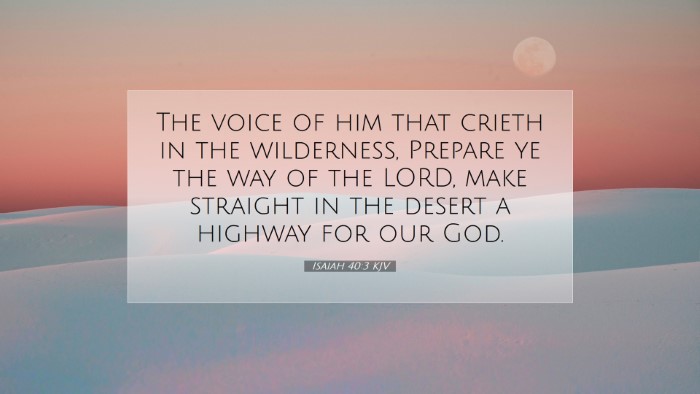Commentary on Isaiah 40:3
Isaiah 40:3 states: "The voice of one crying in the wilderness: Prepare the way of the Lord; make straight in the desert a highway for our God." This verse is a pivotal proclamation, rich in theological significance and eschatological implications, as noted by various public domain commentaries.
Historical Context
The context of this passage is set during a time of exile for the Israelite people. The prophet Isaiah speaks to a nation experiencing despair, yearning for deliverance and restoration. This cry for preparation underscores a future hope in the coming of the Lord, signaling the end of their suffering.
Matthew Henry's Insights
Matthew Henry elaborates on the deep spiritual implications of this verse. He emphasizes the importance of preparation—a theme that resonates throughout both the Old and New Testaments. Henry posits that the 'voice' mentioned represents not only the prophet but foreshadows John the Baptist who prepared the way for Christ. His commentary highlights the necessity of clearing our hearts and minds to welcome God’s grace.
Albert Barnes' Interpretation
Albert Barnes presents a detailed examination of the metaphorical language in Isaiah 40:3. He suggests that 'the wilderness' is symbolic of the human condition, a state of barrenness and desolation without God. Barnes explains that the 'highway' signifies a direct and unobstructed path to salvation, urging believers to remove obstacles that hinder their relationship with God. Barnes importantly notes that this call to prepare the way isn't just for the physical coming of the Lord but is spiritually applicable to everyday life.
Insights from Adam Clarke
Adam Clarke challenges readers to reflect on the active role one must take in preparing for the Lord's coming. According to Clarke, this preparation involves repentance, humility, and a sincere longing for divine intervention. He also mentions that the reference to 'making straight in the desert' reflects God’s ability to transform desolation into a landscape ready for divine encounters, encouraging believers to have faith in God's transforming power.
The Theological Significance
Theologically, Isaiah 40:3 establishes a critical link between the Old Testament prophecy and its New Testament fulfillment in Christ. It serves as a call to action for believers to engage in spiritual preparation—acknowledging their own wildernesses and desiring God's presence.
-
Preparation: The act of preparing oneself spiritually for God's arrival is emphasized, suggesting that readiness is crucial for receiving God's blessings and fulfilling His purposes.
-
Repentance: The call to repentance is a recurring theme, reminding the followers of God to turn away from sin and restore their relationship with Him.
-
Hope: The verse instills hope for restoration, showcasing God's promise to lead His people out of despair into a renewed state of being.
Applications for Today’s Believers
Isaiah 40:3 encourages contemporary believers, pastors, and theologians to reflect on how they can prepare the way for the Lord in their lives and communities. This preparation can take many forms:
- Self-Examination: Regularly assessing one’s spiritual health and making necessary adjustments is vital.
- Community Engagement: Actively fostering community relationships that reflect God's love to others can prepare the way for collective spiritual renewal.
- Evangelism: Sharing the message of Christ effectively prepares both individual hearts and society for His work.
Conclusion
Isaiah 40:3 profoundly encapsulates the call for preparation and serves as a poignant reminder of God’s promise to intervene in human history. The insights from Matthew Henry, Albert Barnes, and Adam Clarke collectively urge believers to take this verse seriously, inviting them to recognize their need for spiritual readiness and the hope that the Lord brings to desolate places. As we apply these principles, we align ourselves with God’s eternal purpose and prepare our hearts to receive His transformative presence.


